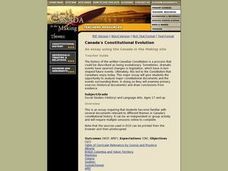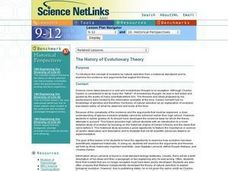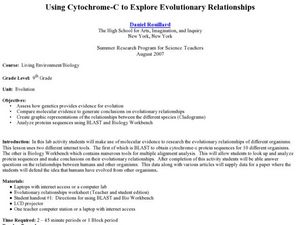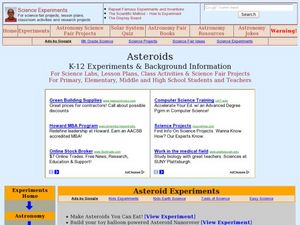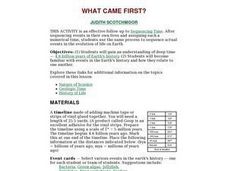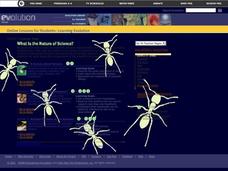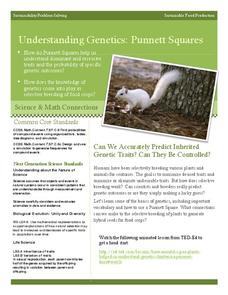Curated OER
Canada's Constitutional Evolution
Students research and write an essay relevant to different themes in Canada's Constitutional History.
Curated OER
The History of Evolutionary Theory
Students are introduced to the concept of evolution by natural selection from a historical standpoint. They examine the evidence and arguments that support the theory of natural selection.
Curated OER
Using Cytochrome-C to Explore Evolutionary Relationships
Young scholars analyze protein sequences. In this lesson on determining evolutionary relationships, students use the Internet tools BLAST and Biology Workbench to look at protein sequences. Young scholars will compose an essay that...
Curated OER
Why Cladistics?
Students explore how biological classification is intimately associated with evolution.
Curated OER
Asteroids
Learners examine a potential asteroid impact site. They describe evidence and theories for extinction events.
Curated OER
The Flat Earth
Students use scientific explanations to discuss the shape of the Earth. In this research based lesson, students will explore various concepts about how scientist use evidence to determine if the Earth is flat or round. Students will hold...
Curated OER
New Technologies
Students analyze how technology has changed over time. They identify technologies that did not exist in the past and might be invented in the future and design a poster that illustrates the evolution of one kind of technology and...
Curated OER
The Crusty Fossils
Students identify some of the different species of crabs and tell how they adapt themselves to their environment. They discuss the evolution and stages of development of the crabs. They identify the Phylum Arthropoda and the Class...
Smithsonian Institution
Of Human Bondage: George Washington and The Issue of Slavery
Learners read and interpret four documents George Washington wrote regarding his slaves. They analyze why George Washington was conflicted over the issue of slavery. They discuss the evolution of Washington's attitude toward slavery.
Curated OER
Archaeological Study
Young scholars analyze the difference between archaeology and anthropology while studying the evolution of different products. In this archaeology and anthropology lesson, students trace the progression of a certain tool or product and...
Curated OER
Explorations Through Time
In this earth history worksheet, students visit a website and complete 15 fill in the blank and 8 short answer questions based on what they read. Topics include biodiversity, animal kingdoms, evolution, fossils, and extinction.
Curated OER
Studying Fossils
Students study the Evolution in the Light of Fossils. Activities in this lesson range from quantitative measurements of hominoid skulls to the comparison of hominoid bone structures. They hypothesize dinosaur size and speed by looking at...
Curated OER
Why do we need Vitamin C in our diet? Or Why do we carry old inactive genes in our genome?
Students explore and explain how mutations in the DNA sequence of a gene may be silent or result in phenotypic change in an organism and in its offspring. They analyze how evolution and biodiversity are the result of genetic changes that...
Curated OER
Who Stole My Salad?
Eighth graders explain how protein is made in the cell. In this biology lesson plan, 8th graders translate RNA and DNA using an internet database. They determine the thief based on evidence collected.
Curated OER
What came first?
Students sequence events in their own lives and assign each a numerical time, students use the same process to sequence actual events in the evolution of life on Earth.
Curated OER
Mechanism of Our Eyes
Students study the eye as the organ of vision, They look at a drawing of the eyes and study the names of the parts. While working with a partner, they observe what happens when the lights are turned lower and lower. Finally, they look at...
Curated OER
Global Awareness
Students read about how scientists are arriving at current theories of human origin and migration through mitochondrial DNA analysis. They then piece together a map showing the data from mitochondrial DNA analysis to plot the migration...
Curated OER
What is the Nature of Science?
Students examine videos of field researach to discover the components of the scientific process. Using forms, they conduct community surveys about the nature of science. They research the extinction of dinosaurs and compare...
Curated OER
Ancient Farmers of the Amazon
High schoolers read a sample research proposal and create their own. They discover the type of information needed for others to reject or accept the proposal. They practice applying the scientific process to different situations.
Western Kentucky University
Understanding Genetics: Punnett Squares
Can scientists really predict genetic outcomes or are they simply making a lucky guess? Scholars first learn about Gregor Mendel and how to make Punnett squares. Then they extract DNA from a strawberry in a lab with included conclusion...
Curated OER
How Do New Species Form?
Students read an article by Niles Eldridge about species and the environment and break into small groups to discuss it. They write essays noting strengths and weaknesses of punctuated equilibrium and gradualism, or other topics listed.
Curated OER
Microbes: Too Smart for Antibiotics?
Students examine how germs spread from one person or object to another. They discuss antibiotic resistant bacteris and examine the benefits of microorganisms. They explore methods of curbing antibiotic resistance.
Curated OER
Niches and Adaptations
Students present information about a species, its niche, and adaptations. In this lesson on animal environments, students explore how surroundings can affect a given population resulting in adaptation.
Harry S. Truman Library & Museum
Marshall Plan: Convince the American People
This is an excellent resource for US history classes, especially AP history. After learning some background on the Marshall Plan, the class, divided into two groups, researches opposing positions on this aid program. Groups read and...
Other popular searches
- Dna Evidence for Evolution
- Fossil Evidence of Evolution
- Evidence for Evolution Whale
- Evolution Evidence
- Fossil Evidence Evolution


